now I will have nightmares
31.10.2025 16:06 — 👍 1 🔁 0 💬 0 📌 0Ed Merkle
@edgarmerkle.bsky.social
quantitative psychologist, open source enthusiast, recently working on R package blavaan
@edgarmerkle.bsky.social
quantitative psychologist, open source enthusiast, recently working on R package blavaan
now I will have nightmares
31.10.2025 16:06 — 👍 1 🔁 0 💬 0 📌 0Very useful for my multilevel class. I currently get an error when I choose subject 330 or above, maybe related to the fact that the subject numbers don't go up sequentially?
10.10.2025 14:23 — 👍 1 🔁 0 💬 1 📌 0A new semester is upon us! This time, I’m teaching Structural Equation Modeling. Want to follow along? Here you go: jonathantemplin.github.io/Structural-E... and www.youtube.com/playlist?lis... #StatModeling #SEM
28.08.2025 16:29 — 👍 6 🔁 2 💬 0 📌 0
Don’t miss out on short courses at IMPS 2025! We have 4 short courses to choose from.
www.psychometricsociety.org/imps2025-sho...
#IMPS2025 #Psychometrics #QuantitativePsychology #rstats


You want to fit structural equation models in Julia? No problem with the StructuralEquationModels.jl package. Ships with worked examples and tutorials on how to modify the objective function easily (e.g., adding a regularization penalty). Find our preprint here osf.io/preprints/ps...
07.05.2025 13:37 — 👍 12 🔁 3 💬 0 📌 0Not sure if it is what you are thinking of, but it reminds me of the paper by @charlesdriver.bsky.social
osf.io/preprints/os...
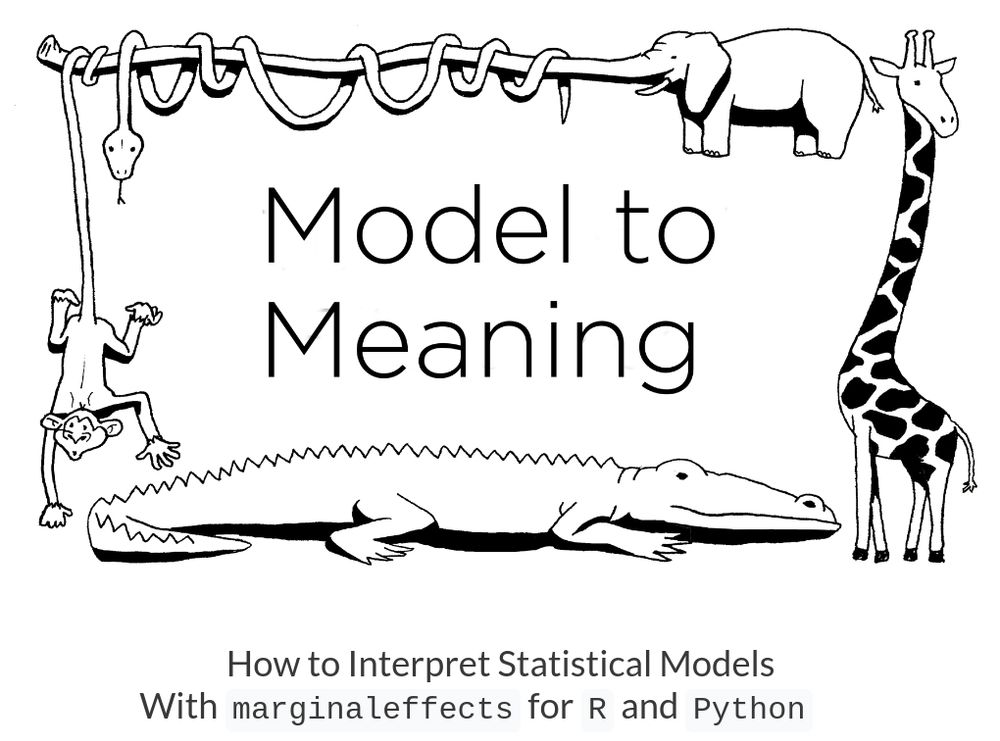
Model to Meaning: How to interpret statistical models with marginaleffects for R and Python
📚😅🎉
Yay!! I just submitted the complete manuscript of my upcoming book to the publisher!
Learn to easily and clearly interpret (almost) any stats model w/ R or Python. Simple ideas, consistent workflow, powerful tools, detailed case studies.
Read it for free @ marginaleffects.com
#RStats #PyData

CmdStanR v 0.9.0 released! According to Andrew Johnson, this should make Windows installation easier plus many other improvements and bug fixes discourse.mc-stan.org/t/cmdstanr-v...
#Bayesian #MCMC
Huzzah! Great news for psychometric software!
Psychometrika now accepts software submissions under "Applications and Case Studies" AND software reviews in their expanded Review Section. This dual recognition elevates the status of programming in the field.
#psychometrics #OpenScience
Here is a new post providing some intuition about the proportional odds restriction in ordinal regression models. Maybe you, or your LLM, will find it useful.
21.02.2025 15:15 — 👍 3 🔁 1 💬 0 📌 0
Fellow probabilistic programmers I came up with a parameterization for a Cholesky factor of correlation matrices that looks good. I'm asking to test and see if it works well for you discourse.mc-stan.org/t/updated-ch...
#rstats #statistics #bayesian
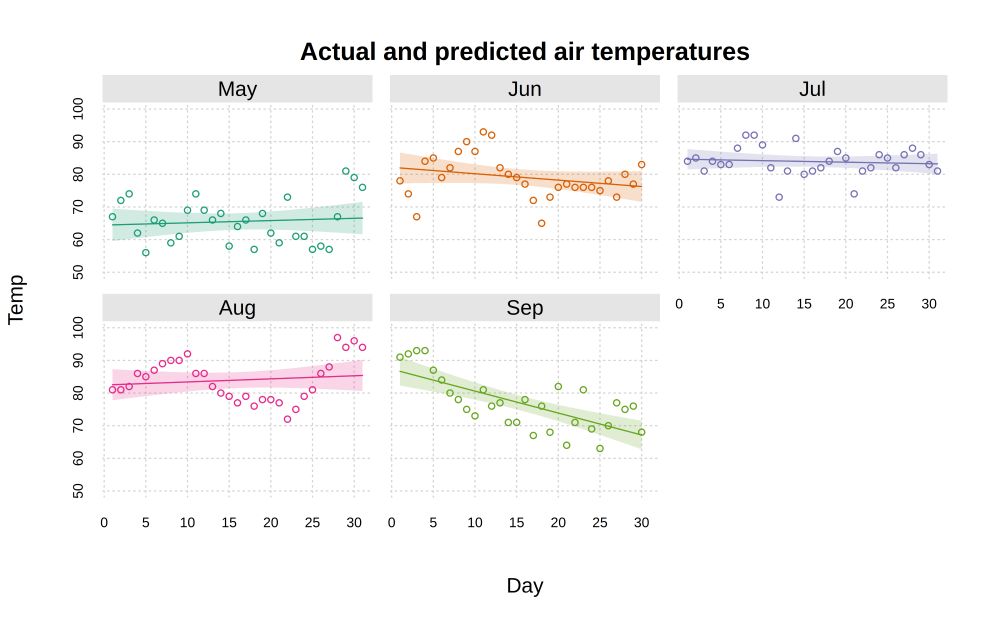
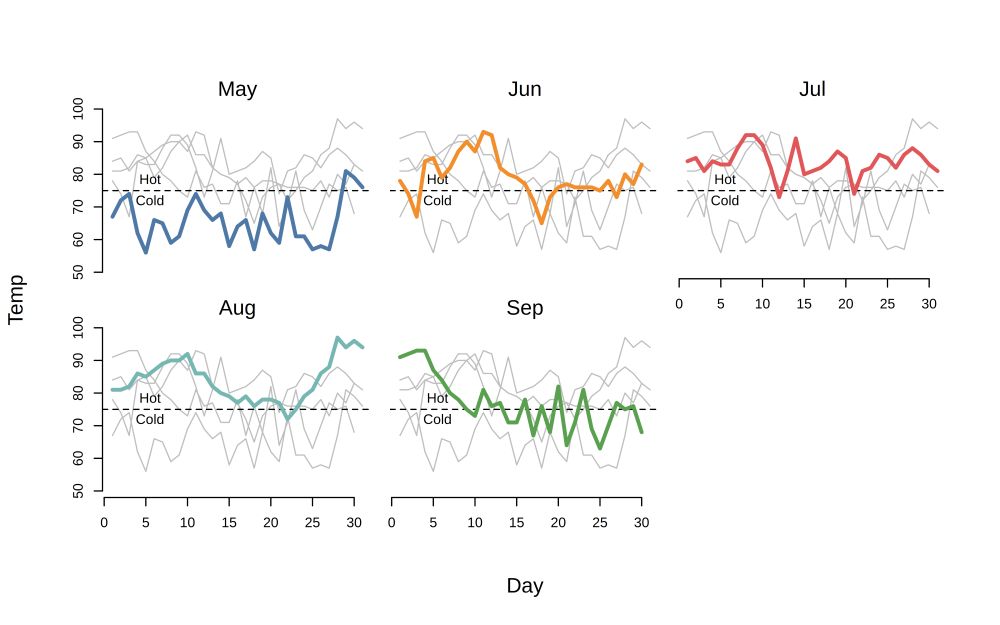
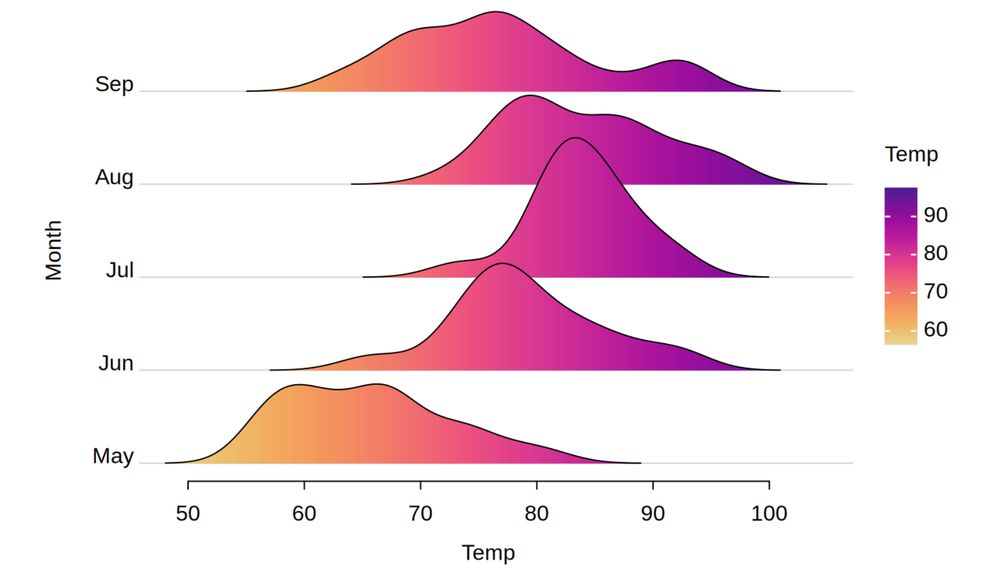
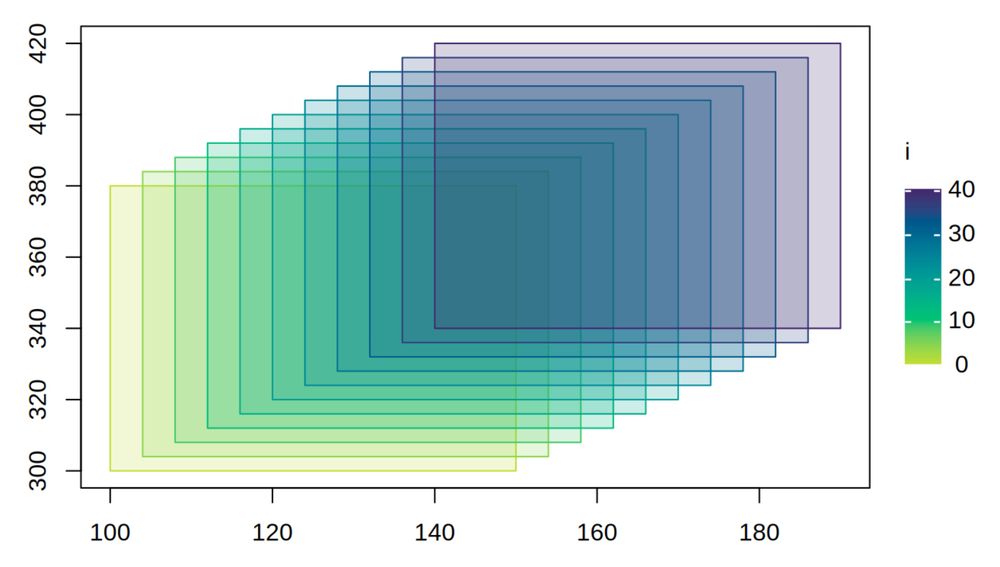
{tinyplot} 0.3.0 is out! 🚨
It's a lightweight #Rstats 📦 to draw beautiful and complex plots, using an ultra-simple and concise syntax.
This is a massive release! @gmcd.bsky.social @zeileis.org and I worked hard to add tons of new themes and plot types.
Check it out!
grantmcdermott.com/tinyplot/
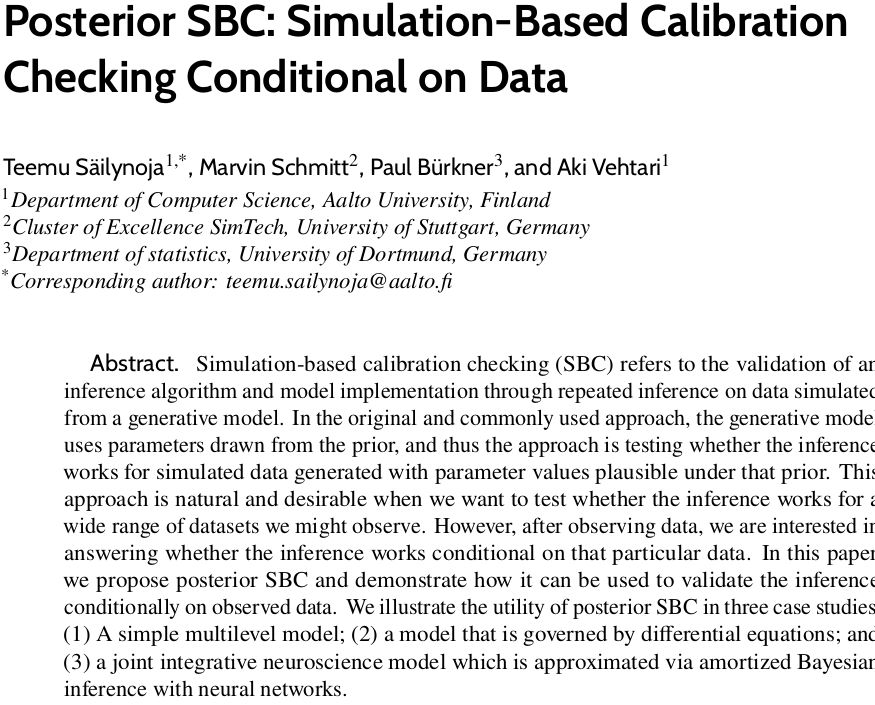
Title: Posterior SBC: Simulation-Based Calibration Checking Conditional on Data Authors: Teemu Säilynoja, Marvin Schmitt, Paul Bürkner, Aki Vehtari Abstract: Simulation-based calibration checking (SBC) refers to the validation of an inference algorithm and model implementation through repeated inference on data simulated from a generative model. In the original and commonly used approach, the generative model uses parameters drawn from the prior, and thus the approach is testing whether the inference works for simulated data generated with parameter values plausible under that prior. This approach is natural and desirable when we want to test whether the inference works for a wide range of datasets we might observe. However, after observing data, we are interested in answering whether the inference works conditional on that particular data. In this paper, we propose posterior SBC and demonstrate how it can be used to validate the inference conditionally on observed data. We illustrate the utility of posterior SBC in three case studies: (1) A simple multilevel model; (2) a model that is governed by differential equations; and (3) a joint integrative neuroscience model which is approximated via amortized Bayesian inference with neural networks.
If you know simulation based calibration checking (SBC), you will enjoy our new paper "Posterior SBC: Simulation-Based Calibration Checking Conditional on Data" with Teemu Säilynoja, @marvinschmitt.com and @paulbuerkner.com
arxiv.org/abs/2502.03279 1/7
The Psychometric Society invites IMPS 2024 presenters to submit manuscripts to the 2024 Proceedings.
Intent to Submit Deadline: February 14, 2025
Manuscript Deadline: March 21, 2025
www.psychometricsociety.org/imps2024-pro...
#psychometricsociety #psychometrics #quantitativepsychology
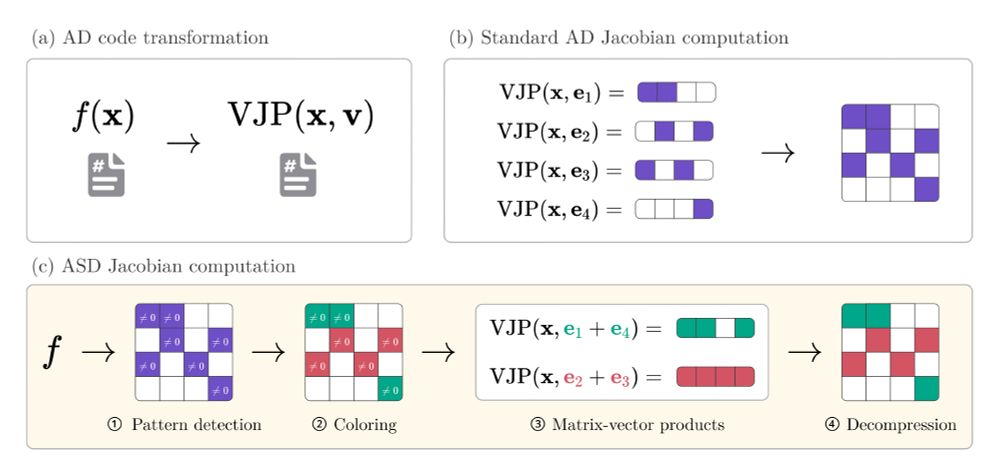
Figure comparing automatic differentiation (AD) and automatic sparse differentiation (ASD). (a) Given a function f, AD backends return a function computing vector-Jacobian products (VJPs). (b) Standard AD computes Jacobians row-by-row by evaluating VJPs with all standard basis vectors. (c) ASD reduces the number of VJP evaluations by first detecting a sparsity pattern of non-zero values, coloring orthogonal rows in the pattern and simultaneously evaluating VJPs of orthogonal rows. The concepts shown in this figure directly translate to forward-mode, which computes Jacobians column-by-column instead of row-by-row.
You think Jacobian and Hessian matrices are prohibitively expensive to compute on your problem? Our latest preprint with @gdalle.bsky.social might change your mind!
arxiv.org/abs/2501.17737
🧵1/8
Now out in PNAS, we provide a conceptual framework for assessing replication decisions and replication reform.
Do you view the scientific literature as a "book of truths" or a "book of conversations"?
www.pnas.org/doi/abs/10.1...
#philsci #science #SciSci #Metascience

Call for Abstracts for IMPS 2025
The Psychometric Society Invites You to Submit an Abstract for IMPS 2025!
The abstract submission portal is scheduled to open Jan 29, 2025
Please see the society website for details: www.psychometricsociety.org/post/imps-20...
Our friend and colleague Fritz Leisch died in April last year. In a new contribution to The R Journal we honor Fritz and commemorate his many contributions to science in general and to the R community in particular. #rstats
journal.r-project.org/articles/RJ-...

I am so proud of the Psychometric Society having the courage to transition Psychometrika to Open Access. Practically all APCs are covered by TAs (see bit.ly/3NiAy6T) and for authors not covered will be waived! Support open science for everybody, send your best work to Psychometrika at bit.ly/4eXTvYp
09.10.2024 20:24 — 👍 78 🔁 28 💬 1 📌 2
New preprint with @winterstat.bsky.social and Ellen Fitzsimmons on ordinal factor analysis, where the latent variables are scaled so that they generally take values from 1 to # of ordered categories. The scaling is intuitive because it is what you use when you treat ordinal variables as continuous.
15.01.2025 14:51 — 👍 14 🔁 7 💬 0 📌 0OK, here is a very rough draft of a tutorial for #Bayesian #SEM using #brms for #rstats. It needs work, polish, has a lot of questions in it, and I need to add a references section. But, I think a lot of folk will find this useful, so.... jebyrnes.github.io/bayesian_sem... (use issues for comments!)
21.12.2024 19:49 — 👍 226 🔁 60 💬 9 📌 1
This guy is also a worthy Wipeout contestant www.youtube.com/watch?v=906b...
18.12.2024 21:37 — 👍 2 🔁 1 💬 1 📌 0
2. Frontiers for Young Minds
Now this is an excellent initiative. If you haven't heard of this, researchers write papers targeted at kids or teenagers. But the kicker is that your target audience co-peer reviews the paper! Usually, this is done collectively as a science class

working extra hard on more administrative tasks so that I can clear time to properly read this - looks very interesting!!
arxiv.org/abs/2412.07999
'Fast Mixing of Data Augmentation Algorithms: Bayesian Probit, Logit, and Lasso Regression'
- Holden Lee, Kexin Zhang
Super stoked to announce that {greta} version 0.5.0 is now on CRAN! Thank you to Nick Golding for making this release happen, and for his continued support, I learnt a lot!
Some features I'm really excited about:
- Now uses Tensorflow 2.0 (which involved a heavy refactor of internals)
- […]
Deck.blue is good, you should check it out
12.11.2024 20:38 — 👍 2 🔁 1 💬 0 📌 0Jorgensen & Garnier-Villarreal have a helpful paper showing several failures with "small-variance priors" in Bayesian SEM doi.org/10.1007/978-...
These priors will fail for the types of misspecification we create in simulation studies, wrote a blogpost: www.jamesuanhoro.com/post/2024/11...

I recently got to work on a fun chapter, and the preprint is now available: arxiv.org/abs/2411.04260
We provide intuitions, examples, and recommendations for running MCMC in a world where GPUs and autodiff exist (like this world!)